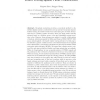541 search results - page 108 / 109 » A generic attack to ciphers |
107
click to vote
CTRSA
2003
Springer
15 years 7 months ago
2003
Springer
Exposure of secret keys seems to be inevitable, and may in practice represent the most likely point of failure in a cryptographic system. Recently, the notion of intrusion-resilien...
114
Voted
ICALP
2010
Springer
15 years 6 months ago
2010
Springer
Knowledge extraction is a fundamental notion, modeling machine possession of values (witnesses) in a computational complexity sense and enabling one to argue about the internal st...
118
click to vote
ESORICS
2008
Springer
15 years 3 months ago
2008
Springer
Abstract. Identity fraud (IDF) may be defined as unauthorized exploitation of credential information through the use of false identity. We propose CROO, a universal (i.e. generic) ...
146
click to vote
ISPEC
2011
Springer
14 years 4 months ago
2011
Springer
Abstract. Broadcast encryption provides a convenient method to distribute digital content to subscribers over an insecure broadcast channel. Traitor tracing is needed because some ...
146
click to vote
CRYPTO
2011
Springer
14 years 1 months ago
2011
Springer
In CRYPTO 1997, Canetti et al.put forward the intruiging notion of deniable encryption, which (informally) allows a sender and/or receiver, having already performed some encrypted...

